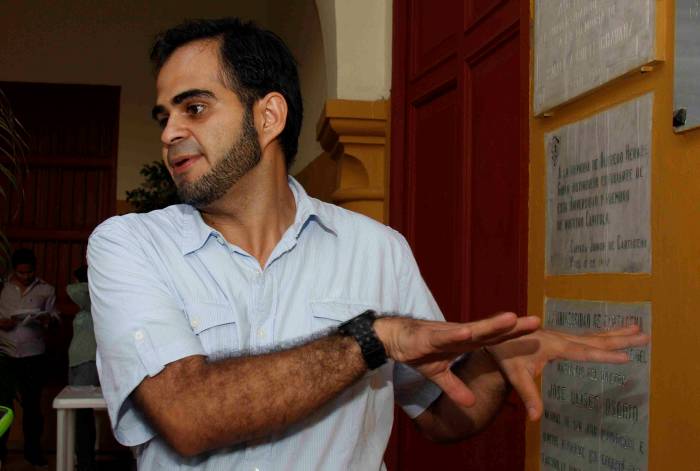Author: Elisabeth Wilder
On February 21, 2017, three prominent human rights defenders gathered at the Washington Office on Latin America to talk about their work with Colombia’s LGBTQI community. Marcela Sánchez Buitrago, director of Colombia Diversa, Wilson De Jesús Castañeda Castro, director of Caribe Afirmativo, and Déborah Skenassy, executive director of Santamaría Fundación, spoke about the challenges facing LGBTQI people in post-accord Colombia.
| Marcela Sánchez Buitrago, director of Colombia Diversa Source: Colombia Diversa |
Though the revised accords between the FARC and Colombian government have been signed, approved, and are in the process of being implemented, there is still a lot of work to be done in Colombia beyond the demobilization of the guerilla group and the removal of illicit crops. Sánchez, Castañeda, and Skenassy remarked that the peace process has actually brought about a new set of challenges for Colombia’s LGBTQI community.
When the first version of the peace accords was released, the issue of so-called “gender ideology” deeply polarized Colombian society. Some right-leaning religious and political leaders across the country rallied against the peace accords because of their inclusion of LGBTQI victims and attention to women’s rights. Some argue opposition to the accords’ misconstrued gender-focused narrative led to the win of the ‘No’ vote in the plebiscite.
The Evangelical Backlash
 |
|
| Wilson De Jesús Castañeda Castro, director of Caribe Afirmativo Source: El Universal |
Like in other countries in Latin America, evangelical Christians have a large presence in Colombia. While many Protestant churches in Colombia for years have worked to build support for peace and organized in favor of the ‘Yes’ vote, some evangelical pastors rallied for the ‘No’ and against some of the Santos Administration’s more left-leaning policies, including LGBTQI-friendly ones. According to Marcela Sánchez, the religious right has begun using populist strategies to argue that the government is giving LGBTQI persons unwarranted special rights and protections, and even that the basic family unit is under attack because of LGBTQI people.
In order to combat the backlash, Colombia Diversa and partnering organizations have been working to create both regional and international strategies to combat this fear-mongering and irrational rhetoric. Human rights defenders in Colombia are also drawing more on emotional narratives to get their message of inclusion across, and are beginning to refocus their campaigns, moving from specific to more general arguments to protect all LGBTQI people.
Police Codes and Trans Women
Another challenge in post-accord Colombia is the adjustment to the new Colombian police codes. LGBTQI people have routinely been targets of police brutality over the years and have been criminalized for showing affection to partners or dressing in clothing that seemingly contradicts their sex. Trans women, particularly sex workers, have been one of the largest populations to be targeted by police violence due to their visibility. The new police codes, while troubling for the freedom that they give to police officers to exercise authority if they feel threatened or disrespected, offer some hope since they include small yet positive measures to prevent threats to LGBTQI persons.
| Déborah Skenassy, executive director of Santamaría Fundación Source: Santamaría Fundación |
Moving Forward: Strategies and Hopes for the Future
Sánchez, Castro, and Skenassy also spoke about the findings of a 2015 report put out by their organizations and other civil society groups about human rights abuses against Colombian LGBTQI people and rights defenders. The findings of the report indicate that around 110 homicides motivated by prejudice were committed against LGBTQI members in 2015. The report also notes numerous cases of harassment, injury, and exclusion from public spaces.
It is clear that though Colombia has made significant strides in the last ten years by securing the right to same-sex marriage, legalizing adoption for same-sex couples, and including LGBTQI people as victims of the conflict, there are still many challenges for the LGBTQI community in today’s post-accord Colombia. As these three human rights defenders look toward the future for a more secure place for LGBTQI people, they hope to engage with the intersectionality of issues that come not only with sexual orientation and gender identity, but also with race and class. In spite of the backlash, Colombia Diversa, Caribe Afirmativo, the Santamaría Fundación, and similar organizations will continue to work for peace and justice for people of all genders and sexualities.
Elisabeth Wilder is LAWG’s Spring 2017 Colombia intern.

